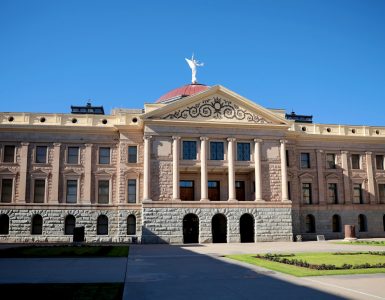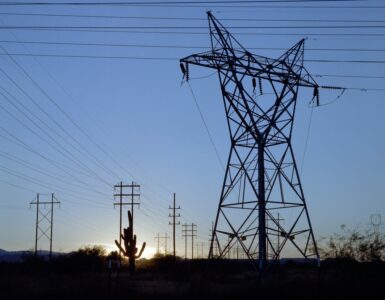The United States was founded on the idea that citizens should choose how they are governed and who is governing them, making elections the backbone of the country’s democracy.
In 2016, the public’s attention was drawn to election security after evidence emerged of foreign efforts to interfere with state voter registration systems.
State election officials are on the front lines of the cyberwar, especially in Arizona.
The FBI told Arizona officials that cybercriminals assaulted the system in June of 2016. Matt Roberts, a spokesman for then-Arizona Secretary of State Michele Reagan (R), told The Washington Post that in response Reagan would shut down the state’s voter registration system for nearly a week.
“Episodes like these undermine faith in our democratic system, and steps must be taken to prevent them from occurring again,” said an Alliance for Securing Democracy (ASD), Pitt Cyber, R Street and Brennan Center for Justice report.
Last year, Congress passed the Help America Vote Act (HAVA) which provided $380 million in grants to help states bolster election security.
The ASD, Pitt Cyber, R Street and Brennan Center report examined how Arizona and five other states allocated their share of the funds and what is additionally needed to secure future elections.
“Lawmakers are asking, ‘okay we passed more funding for state election security in 2018, how is that money being spent and why do we need additional funding?’” Rachael Dean Wilson, head of external affairs at ASD, said. “This report is really a response to that.”
Arizona received $7,463,675 from the federal government. The state matched $373,184.
All of the funds were put toward:
- Voter registration database replacement — “When our online database was created, cybersecurity was an afterthought. Now, faced with international threats, we must have a system that implements strong protections and the highest level of security capabilities to protect voter data,” Reagan said; however, the total cost was between $7 and $10 million and Arizona only put roughly $2.8 million toward the project.
- Cybersecurity — The remaining $5 million went toward other cybersecurity projects that included:
- Security assessments: the state partnered with a private vendor who conducted an assessment of the current IT infrastructure that is critical to the election system and provides a framework for future spending.
- Information sharing: Arizona is partnering with local election officials to create stable communication and “build a culture of support between the state and local election officials.”
- Cybersecurity subgrants to local election officials: state officials will be working in conjunction with local election officials to distribute a portion of the grants to communities.
However, according to Wilson and ASD Deputy Director David Salvo, funding is needed well past the 2020 election.
“The overwhelming majority of states would gladly receive more federal funding for unmet election security needs,” Salvo said. “State local governments are going against adversaries that have…vast resources… $380 million may seem like a lot of money, but…this is just a drop in the bucket really.”
“We want to keep states in control of their elections, but we want to make sure that the federal government is providing the necessary support for them to realistically be able to do that in this kind of new era [where] we need to be thinking about election security in a new way,” Wilson added.
Arizona officials currently do not have the funds needed to expand cybersecurity assistance to local election officials or replace legacy voting systems, according to the report.
One way current Arizona Secretary of State Katie Hobbs (D) said she would consider using federal funds is for creating greater cybersecurity assistance to local election officials. This means state programs could provide essential services to local election officials who lack dedicated IT staff and may be at a greater risk.
Another danger zone is Arizona’s legacy voting system.
These are a security risk because many Arizona counties are using aging voting systems that often use outdated hardware that is no longer manufactured, making replacing parts nearly impossible; they use outdated software that does not receive regular security patches; and they do not have the security features of systems today.
It is estimated that replacing the equipment would cost $40 million.
“All of this highlights that there are these longer-term vulnerabilities that existing funding has not yet fully addressed. These examples make a compelling case for the need to look at this challenge over the long term,” Salvo said.
Salvo and Wilson also said that bipartisanship is needed to address the issue.
Arizona is leading the way in bipartisan efforts to address cybersecurity and was recognized by the National Governors Association this month when it selected Arizona for its Policy Academy on Election Cybersecurity.
“Arizona has been a national leader in cyber technology and fostering collaboration between government, business, and nonprofit sectors,” Governor Doug Ducey (R-AZ) said in a statement. “Through this program, we can enhance the positive work happening across our state to make sure Arizona remains at the cutting edge of cyber defense and is as prepared as possible to protect against cyber threats ahead of the coming election.”
The Policy Academy on Election Cybersecurity will give the state technical assistance to develop, implement and scale training throughout Arizona to improve coordination between election officials and reduce cyber-related risks.
“We work every day to safeguard the process at every level,” Hobbs said. “Bipartisan partnerships with state and federal groups, like this policy academy, provide opportunities to share resources and best practices that will enhance these efforts. We are looking forward to working with the National Governors Association to maintain the integrity of Arizona’s elections in the upcoming 2020 election cycle.”
“Election security and strengthening our democracy should not be a partisan issue and it is not a partisan issue and I think you see that on a state level, you see that across Secretaries of States. If you look broadly, there is a need across the board for funding so that the states can bolster their security,” Wilson said.
To view the full report, click here.
















Add comment